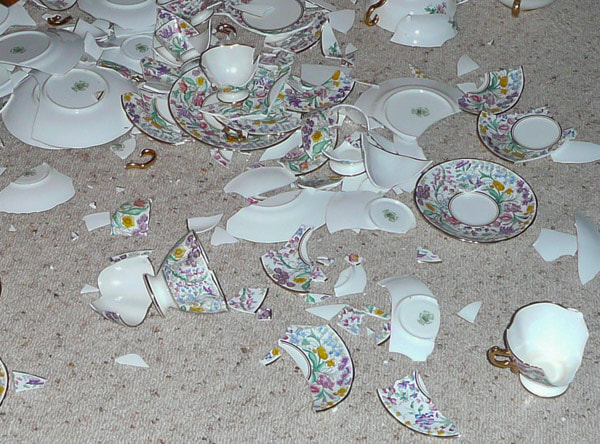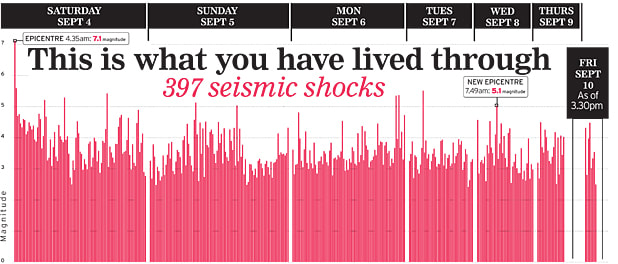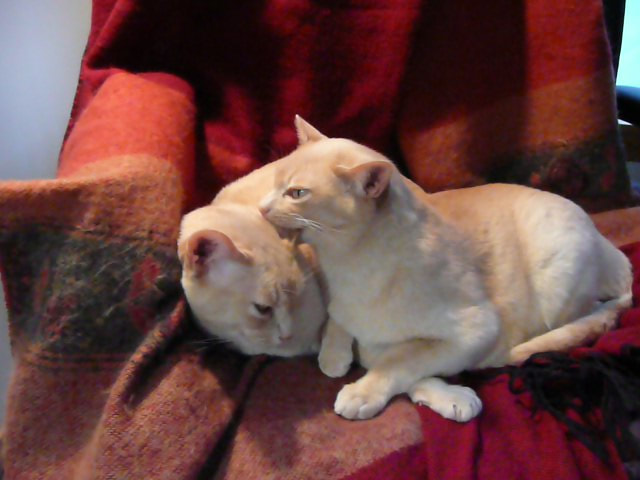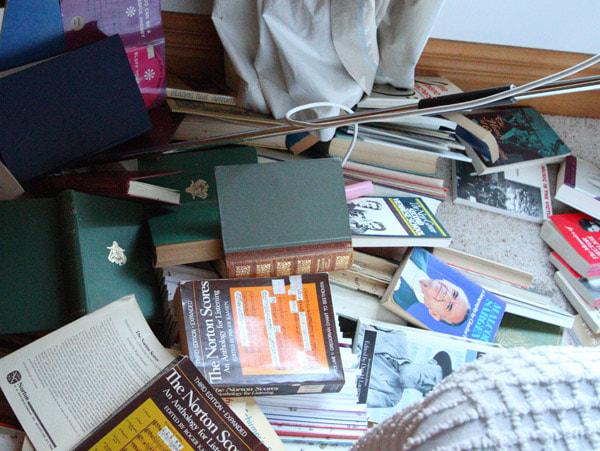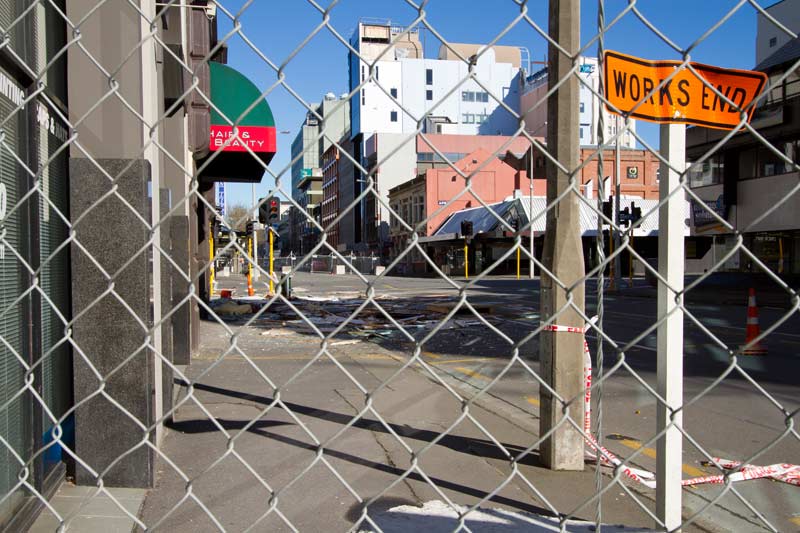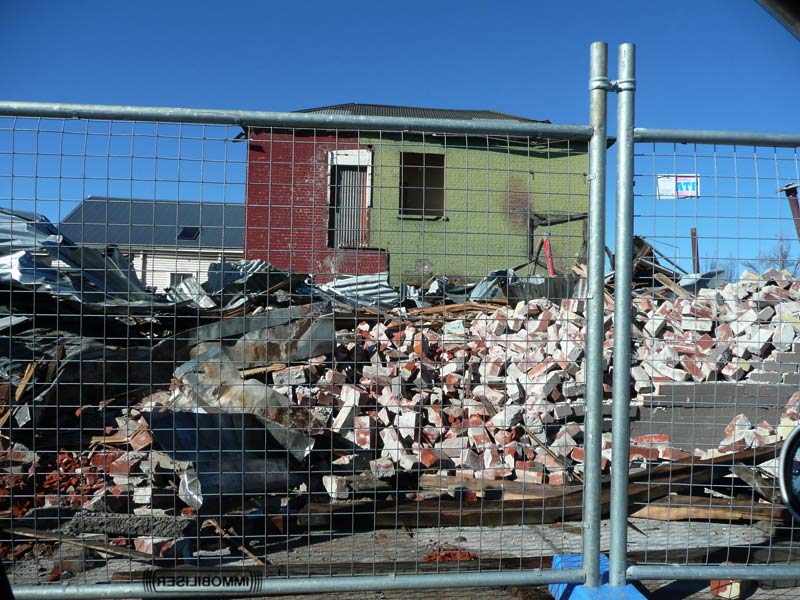September 4th, 2010 ~ a personal note from Jenny
The first major quake which hit at 4.35 in the early morning of September 4, 2010, was magnitude 7.1 on the Richter scale, and centered about 40km away from Christchurch city centre. It was shallow - only 11.4km deep - and released 671 kilo tonnes of energy. Those are the plain facts. The experience was terrifying.
|
Earthquakes have no respect for heirloom items
|
I was used to earthquakes, but not like this.
Not the body-jerking, swaying, rolling and pitching that made getting out of bed and heading for safety under a doorpost almost impossible. Neither the kind which roared and rumbled like a steam train or jet aircraft. Noise came from every direction: the shuddering shaking of a house twisted by gigantic monsters, counterpointed by the high-pitched tinkling of crockery breaking, doors slam-banging open, the TV and computer monitors being hurled from desks and bookshelves tumbling. Everything - absolutely everything from the house itself to tiny ornaments - moving and protesting about it. Think aircraft turbulence, with your home in place of the plane. |
Total darkness
But what was worst was the darkness. Total blackness. No moon, no stars, no street lights, not even the faint glimmer from appliance LED lights. A brief flash in the distance signalled the power transformers had given up the struggle, and second-largest city was enveloped in the pitching, heaving darkness.
Nothing to do but wait for the hours and hours - really only about 40 seconds - of turbulence to stop. I was ashamed to notice that I was shaking uncontrollably, and I couldn't operate my camera properly. I couldn't even remember how to fire the flash.
We knew there would be aftershocks, and in blissful ignorance, thought we had weathered the worst of it. Throughout the day to come, 23 aftershocks greater than 5 on the Richter Scale, and dozens of lesser ones kept us all on a constant state of alert. Perhaps it was best we had no idea there would be more than 14,000 tremors in the coming three years. . . (This graphic from The Press - picture 2. - showing the number between that morning and six days later, will give you an idea. )
But what was worst was the darkness. Total blackness. No moon, no stars, no street lights, not even the faint glimmer from appliance LED lights. A brief flash in the distance signalled the power transformers had given up the struggle, and second-largest city was enveloped in the pitching, heaving darkness.
Nothing to do but wait for the hours and hours - really only about 40 seconds - of turbulence to stop. I was ashamed to notice that I was shaking uncontrollably, and I couldn't operate my camera properly. I couldn't even remember how to fire the flash.
We knew there would be aftershocks, and in blissful ignorance, thought we had weathered the worst of it. Throughout the day to come, 23 aftershocks greater than 5 on the Richter Scale, and dozens of lesser ones kept us all on a constant state of alert. Perhaps it was best we had no idea there would be more than 14,000 tremors in the coming three years. . . (This graphic from The Press - picture 2. - showing the number between that morning and six days later, will give you an idea. )
The Press
Completely unprepared, we had no torch nearby; our ears, the only sense we had to guide us, picked up the ominous sound of running water. The upstairs hot water cylinder had given up the wrestling match and burst its pipes. Amazingly we were briefly able to get cell phone contact and even more of a surprise, our plumber himself. Within two minutes - I kid you not - he was through our door, up fixing the cylinder and varmooshing into the darkness to deal with other fraught customers as if he'd never been.
|
Kate and Bobby comforting each other
|
In the dark, we stumbled around, taking turns to hold the only torch as we tried to clear pieces of broken china and glass out of the way, in between freezing to the spot as each subsequent aftershock hit. Of course, aftershocks are to be expected, but my mind had frozen and I desperately couldn't recall what I should do. It was a choice of either going outside to be squashed by a falling tree, or remain inside, to be entombed by a collapsing building. I chose squishing. We filled as many buckets and pans with water before the supply ran out; as they lined up on the kitchen bench they had their own tsunamis with every tremor.
|
The cats dashed in a blur of feline panic to hide under a bed. When they emerged some hours later it was to spend the rest of the day curled up in a rug, taking turns to suck each other's ear for comfort. Many pets panicked and were lost that night; hardly surprising.
Another daft thing I discovered was the woeful inadequacy of the emergency earthquake kit that I had almost mockingly compiled earlier in the year. The box was full of canned goods and first aid items but the bulk of it was matches and candles. How dumb. No sane person would light a candle in a wooden house that was continuously wobbling like jelly. But we were fortunate. The walls were standing, the roof was still there, and no liquefaction in our area. It would be a matter of riding it out.
Unrelenting noise
Amid this disaster symphony of frequent 'whuuuumps' from impending aftershocks, distant sirens, helicopter thrubbings, our annoying burglar alarm played a solo aria of relentless hysterics in the hallway and neither of us knew how to shut it up. Over it all came the soothing voice of Mayor Bob Parker, through the old battery-powered radio. So there was a world still out there, the city was still alive, thank God, and no-one killed. Who were these noble souls in the radio stations who stuck to their studios, broadcasting the state of chaos and reassurance? And two unforgettable radio interviews: one with a happily gurgling visiting professor from the States, here on a conference about earthquakes, who was scarcely able to contain his delight at having hit the jackpot; and equally delighted, a small boy who was thrilled to bits to find he had his very own mini volcano in his back garden. Welcome to that new word, liquefaction, poor wee innocent...
Amid this disaster symphony of frequent 'whuuuumps' from impending aftershocks, distant sirens, helicopter thrubbings, our annoying burglar alarm played a solo aria of relentless hysterics in the hallway and neither of us knew how to shut it up. Over it all came the soothing voice of Mayor Bob Parker, through the old battery-powered radio. So there was a world still out there, the city was still alive, thank God, and no-one killed. Who were these noble souls in the radio stations who stuck to their studios, broadcasting the state of chaos and reassurance? And two unforgettable radio interviews: one with a happily gurgling visiting professor from the States, here on a conference about earthquakes, who was scarcely able to contain his delight at having hit the jackpot; and equally delighted, a small boy who was thrilled to bits to find he had his very own mini volcano in his back garden. Welcome to that new word, liquefaction, poor wee innocent...
|
Bookcases toppled
|
Bookcases toppled
So. No power, no phone, no internet, no light, and cellphone batteries fading fast. I found an old-style phone that plugged directly into a phone jack and didn't need electricity to operate. Friends could leave voice messages but the ringing tone was mute. We were touched by the people who left clearly anxious messages, but we were powerless to reassure them that all was well. My brother made us laugh by his message saying that he assumed we hadn't answered because we were either dead or out looting. We couldn't phone out for the simple reason that most close friends and family numbers are on short-cut directories on phones and computers - which of course weren't working. Phone connections were themselves intermittent. |
|
Welcome light
I have never felt so grateful in my life for the coming of dawn; a long, long two hours and 17 minutes after the first main quake. It doesn't really help, being able to see, when an earthquake hits. But in one sense it does. We could now see toppled chimneys, but could also see neighbours were safe. The trees were still standing, although the birds were silent. A taxi driver later told me that he had been driving from the airport down Memorial Ave moments after the quake struck, and he was puzzled by the number of dark blobs strewn along the tree-lined avenue. He stopped, and found they were dazed birds that had been ejected from their nests or branches, and were still coming to grips with this new situation. As for our own nest, although there were cracks in our brickwork, thanks to our wooden mainframe, the house was in no danger of falling down. We hoped. As for Christchurch - who knew? No TV, and having to rely on intermittent radio reports which focused quite rightly on the basic necessities of life. How did the town hall fare, and was our organ alright? Carlo Curley was scheduled to play here in 16 days. . . |
PART 2 : Just when we thought it was all over [February 22, 2011]
- So begins the journey - starting with the first inspection of the beloved pipe organ in September. [The first visit. . .] (Opens in a new window on nzorgan.com)

